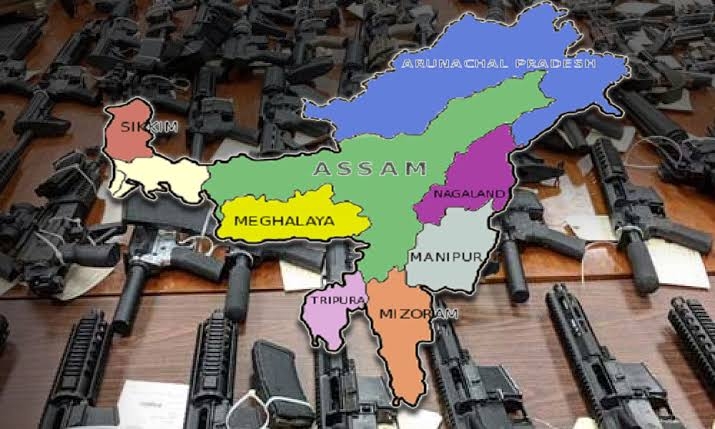The Nexus of Drugs and Arms : Challenges in India's Northeast
The Indian intelligence agencies have also highlighted the role of Pakistan"s ISI in arms and drug transfers into India. Reports also indicate that ISI"s base camp in the Dhubri sector was a hub for smuggling ganja and brown sugar. Such bases in the region are used for drug smuggling.

In India's northeastern region, it has been observed that the flow of arms and drugs follows a disturbingly similar route. The area, often referred to as a part of the Golden Triangle, was once infamous for the largest production of opium in the world. However, since 1999, Afghanistan has taken over as the leading producer.
Khun Sa, the notorious drug baron, had an early influence across the Bangladesh-India frontiers, with major drug routes passing through Cox Bazar. His surrender in 1996, along with agreements with Myanmar's rebel groups, broke his drug cartel. But this led smaller groups to directly enter the drug trade, relying on outsiders for logistics, as narcotics production continued to flourish in the region.
The Indian intelligence agencies have also highlighted the role of Pakistan's ISI in arms and drug transfers into India. Reports also indicate that ISI's base camp in the Dhubri sector was a hub for smuggling ganja and brown sugar. Such bases in the region are used for drug smuggling.
According to various sources, the United Liberation Front of Asom (ULFA) was known to have diversified into various income-generating projects in Bangladesh, including hotels, clinics, and schools, to sustain its activities. Similarly, underground groups from Myanmar, like the Zomi Liberation Front, have found shelter in Manipur and Mizoram, using the porous border between Moreh and Tamu for movement and drug routing.
The NSCN factions, ULFA, and other insurgent groups are reportedly involved in drug trafficking, using the proceeds to fund arms and ammunition purchases. These groups are also known to collaborate with Myanmaerse rebels to ensure the safe passage of drugs across borders.
The proximity of Manipur to the Golden Triangle makes it a hotspot for drug trafficking. Controlled largely by insurgent groups who deal in both drugs and arms, the state serves as a transit point for the illicit trade in opium and heroin. Myanmar's recent coup and the ensuing civil war have exacerbated the situation.
The coup in Myanmar and subsequent civil war have led to an influx of refugees into Manipur, creating instability. This has also boosted cross-border drug smuggling, with poppy cultivation and opium trade escalating. The influx of Chin migrants from Myanmar has led to an increase in poppy cultivation and drug trafficking, exacerbating the problem.
Kuki militant groups are reported to bring in Chin/Kuki migrants from Myanmar and settle them in Manipur.The Manipur government's crackdown on illegal immigrants from Myanmar, particularly the Kuki-Chin tribes, is part of its war on drugs.
The convergence of drug trafficking and terrorism poses a significant challenge to the regional stability. Several groups are seen exploiting these activities to sustain their operations, often in alliance with external narco-terrorist groups, indicating a transnational dimension to the issue. The ethnic conflict between Nagas and Kukis in Manipur has been linked to control over drug trafficking routes, particularly through the border town of Moreh.
This conflict has resulted in violence and displacement, further complicating the situation. The ethnic conflict between Nagas and Kukis further complicates the situation. The struggle to control drug trafficking in border towns like Moreh has resulted in violence and displacement, claiming thousands of lives and causing immense property damage, which we have observed since the violence erupted in Manipur.
Also analysing the timeline of the Manipur violence, we could see the involvement of armed militant groups in drug trafficking, coupled with illegal immigration from Myanmar. This underscores the need for comprehensive security measures in India's northeast.
A multi-dimensional approach is required to address this issue, involving intelligence cooperation, law enforcement, and socio-economic development initiatives. In the past decade, Northeast India has witnessed a series of communal incidents, raising concerns over inter-community harmony and security.
A comprehensive analysis reveals a disturbing pattern of targeted attacks, often resulting in casualties and displacement. The incidents, spanning from 2010 to 2024, highlight the vulnerability of certain communities to communal tensions.
The period between 2010 and 2014 witnessed several incidents across Manipur. Drug trafficking is prevalent at transportation hubs such as railway stations, airports, and border areas, highlighting the strategic importance of these locations for illicit trade.
In some cases, individuals from different communities are involved together in drug trafficking, suggesting collaboration or network connections between Muslim and Kuki groups. Drug trafficking is particularly prevalent in border regions like Manipur, which shares borders with Myanmar and other Northeastern states.
The porous nature of these borders presents challenges for enforcement efforts. Observing the activities of this sensitive issue suggests the presence of some external forces actively working in the veins of the social system with the help of various anti national elements.
Drugs and Arms, which gives rise to narco terrorism, have been structured into a global business model, where the market continues to flourish through several loopholes resulting in the threat to the national security.
Article by

Neptune Barman
Columnist - Writers For The Nation
Writer is pursuing MA in English at Sathyabama Institute of Science and Technology
Nalbari, Assam


